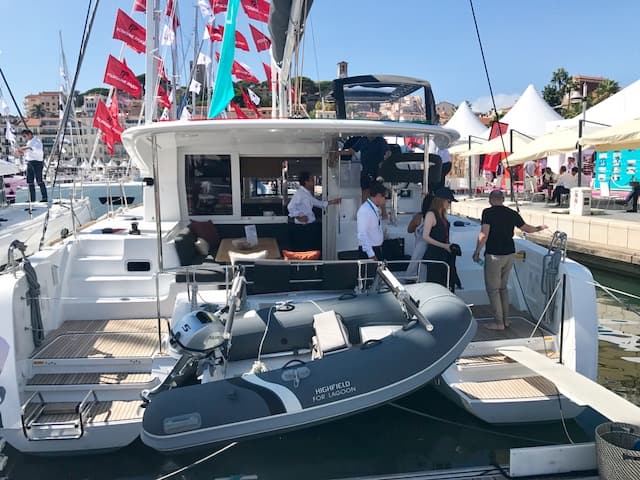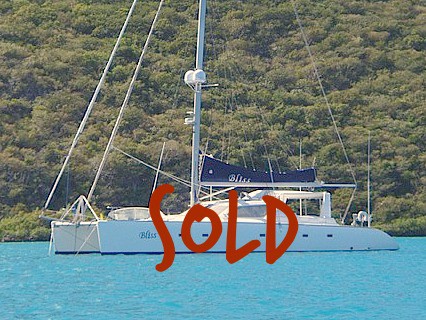The Catamaran Is Priced Wrong
The right price is a function of supply and demand. But how do you know how “in demand” your boat type and model is? How do you know if the location matters for your boat? What are others asking for similar boats? It takes experience to know the answers to these questions as well as access to a large database of boat listings. A yacht broker earns their commission by knowing how to use the information they have to price your boat fairly…for you and for buyers.
A broker can help you objectively assess the condition and features of your boat as well as find comparable boats so that you have a realistic view of not only price, but how long the boat is likely to be on the market. Pricing your boat correctly from the start may save you months of insurance, dockage rental, maintenance, and cleaning fees, insurance costs etc. Do not take any brokers advice personally, but see it as the business transaction that it is.
See here what Catamaran Guru can do for you as a selling broker.
You Are Inflexible On Price Reduction Or Negotiation
Emotional attachment or feeling that you fully vetted your pricing may lead you to fail to see signals that you need to be flexible. Be prepared to lower the boat’s price if you get no requests for showings, consistently receive lower offers, or you receive feedback from prospects that the boat has issues or is just not showing well.
This is where a broker becomes invaluable. They have experience in listening to the market. They can help you address problems that are detracting from your prices or they may provide timely advice that negotiating with a lower price offer is likely you best chance to avoid months of additional ownership costs.
Vessel Importation Issues
If the boat is foreign-built it must be imported to be sold in the United States. When, you see the words “not for sale to US Citizens”, it means that the vessel is foreign-built and has not been imported. This limits the pool of prospective buyers as only non-US citizens can be shown the boat. To sell your foreign-built vessel, you must provide proof that it has been imported. It is a critical piece of paper to keep secure in your boat file. If a boat is US Registered, it usually means that it has been imported before, but proof of the importation is still required.
If your vessel is foreign-flagged, you must import the vessel before offering it for sale to US citizens.
Ignoring Broker’s Advice During Negotiation
Selling a boat is not something most people do that often…that is why a broker is key to helping you avoid pitfalls and get you the best deal for your asset. But, once the negotiations start, sellers often lose sight of the real reason they hired the yacht broker in the first place. Often, they do not listen to a broker’s advice to accept a lower price or to take care of items that are causing poor showings.
When the advice is ignored, ownership costs continue to mount and usually the boat sells for less down the line when it finally sinks in with the seller that the broker was right. Listen to them, feel free to ask lots of questions and politely challenge a position so you can wrap your head around their suggestions, but – you chose your broker because you trust them, right?
The Boat Looks Like the Owner is Still There
Just like with a house, when a buyer boards your boat, they need to be able to see them and their family and friends vacationing or living aboard. Personal photographs, monogrammed home furnishings, and wildly eclectic style will interfere with the positive vibe you want a buyer to have. Remove as many as possible personal items from the boat. Refrain from stuffing them into storage areas as these need to look open, clean, and ready for the buyers’ stuff. These spaces should also be open and accessible for survey.
A good rule of thumb is that if it is not going to be sold as part of the vessel, you don’t leave onboard for showings. Not only does this improve the buyer’s experience and quicken your sale, but it will also avoid unnecessary issues during negotiations.
Showing a Dirty or Unmaintained Boat
Our tips for selling a catamaran include some essential items to clean and repair before listing your boat. No need to spend a lot but remember, first impressions are super important and if your boat is smelly or dirty, your chances of getting a discerning buyer to really take a look and make a serious offer, diminishes by a lot if a well maintained and clean vessel stands in competition to yours.
Take your broker’s advice on all cleaning and repairs as it will help your boat seel faster and for top dollar. It is also a great idea to have a detail-oriented friend, preferably a sailor, give your prepped boat a look over to help you see things you may have overlooked. Once listed, respond to any reports that buyers give about smells, dirt, or problems aboard. Make arrangements for cleaning the interior and exterior including the bottom of the boat on a regular basis. Also, weekly or at least monthly, ensure all the equipment works and the engines get to run for a little while.
The Dinghy is Not Registered
 This is quite possibly THE most annoying detail that holds up a sale! It has happened to us and it took an act of Congress and many weeks of unnessary delays on the closing of the boat to get the dinghy registered!
This is quite possibly THE most annoying detail that holds up a sale! It has happened to us and it took an act of Congress and many weeks of unnessary delays on the closing of the boat to get the dinghy registered!
In the long ago past, a dinghy typically sold along with the boat as as part of the equipment inventory of the vessel. But as superyachts began carrying tenders sometimes as long as 100′ and over $100,000 in value, are the state of Florida began classifying that dinghies and tenders are separate vessels to be sold in separate transactions. But if your dinghy is not registered, it does not have a title to transfer. In this case, make a note on the boat’s specification sheet that the dinghy will not convey with the vessel. If the dinghy will not convey, it is best to remove it so there is no confusion.
If you do want to sell the dinghy, and the registration paperwork is not available, the owner must either:
- Register the dinghy.
- Obtain an original MSO (Manufacturer’s Certificate of Origin) signed by the dealer and provide the original invoice for the dinghy.
Owner’s Lack of Availability
When selling a boat, the owner needs to be available to answer questions, negotiate, and sign papers. Your broker can help you with many of those tasks if you authorize them to do so. For example, if you will be out of the country and the boat might sell during that time, you can instruct your broker about what offer you would be willing to accept so they can negotiate on your behalf, then get your final approval once a satisfactory result has been arrived at. Also, it is important to provide your broker with a Power of Attorney for that asset before travelling abraod to avoid boat sale issues such as having access to a US Notary or signing documents in a timely fashion.
If you address all these issues in advance of listing your boat, it will help you get the best price in the shortest amount of time and with less stress.






